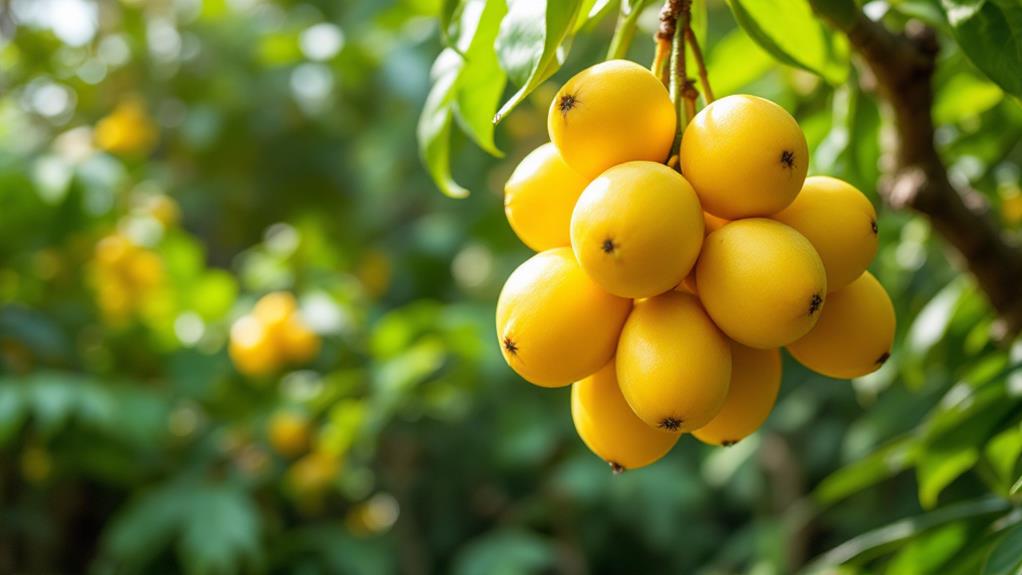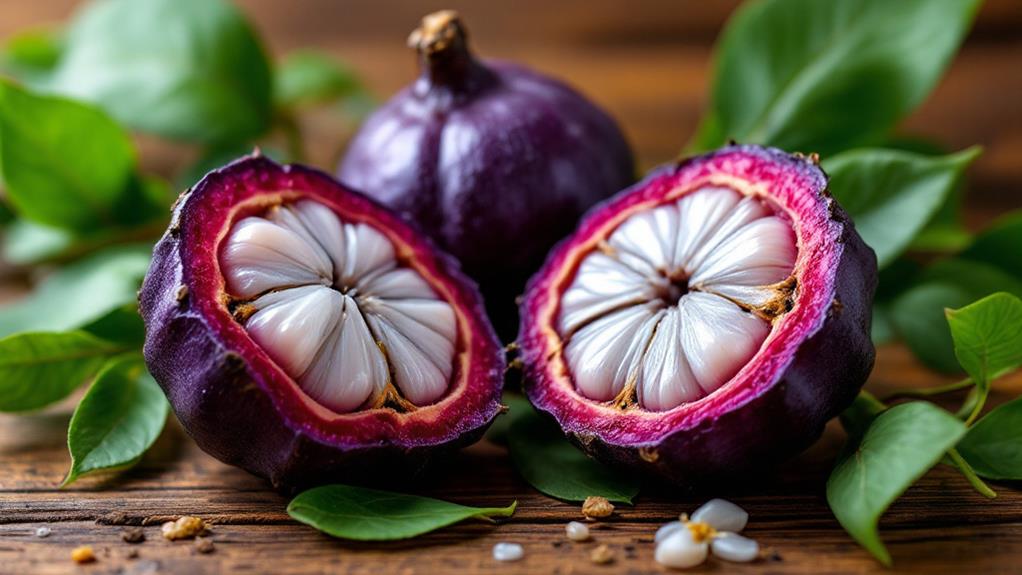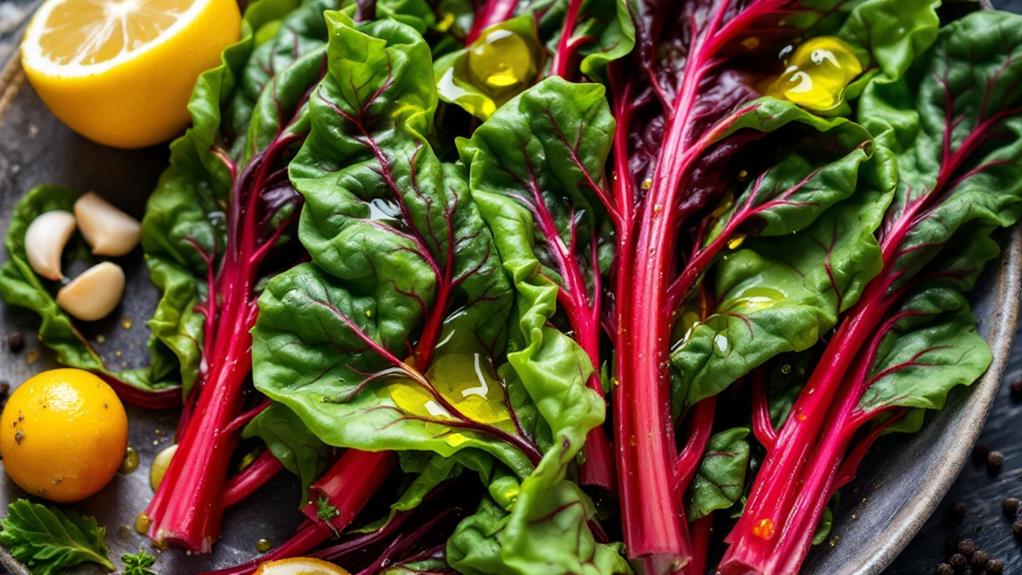Why We Should Consume Plums and Prunes More Often
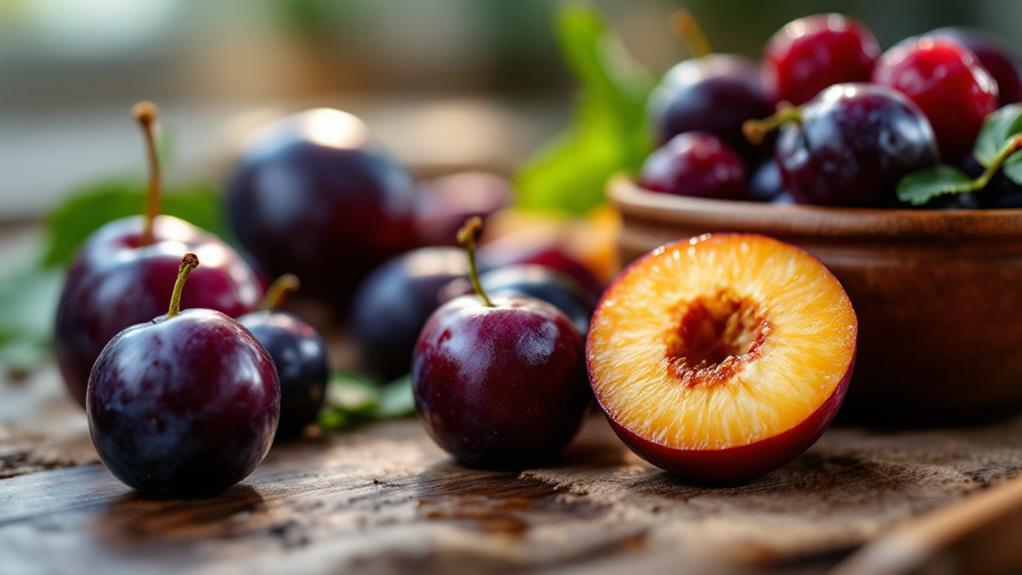
You should eat plums and prunes more often because they offer a bounty of health benefits. They're low in calories and rich in vital nutrients like vitamin C, potassium, and magnesium. These fruits support your immune system, regulate blood pressure, and bolster bone health. High in fiber and sorbitol, they aid digestion and relieve constipation, while their antioxidants improve heart health and lower cholesterol. With a low glycemic index, prunes help manage blood sugar levels, reducing type 2 diabetes risk. Besides health perks, they're versatile in meals, from smoothies to savory dishes. There's more to uncover about these nutritional powerhouses.
Nutritional Benefits
When you're looking for a nutritious snack, plums and prunes are excellent choices. Plums are a low-calorie, nutrient-dense option with only 30 calories per serving. They provide fundamental nutrients like Vitamin C, which contributes to immune health, and potassium, important for maintaining healthy blood pressure levels. Their rich antioxidant content, including phenolic compounds, helps combat oxidative stress, promoting general health.
Prunes, while slightly higher in calories at 67 per serving, pack a powerful nutritional punch. They're particularly high in Vitamin K, offering 21% of your recommended daily intake. This vitamin plays a key role in supporting bone health and reducing osteoporosis risk. Prunes also contain 2g of fiber per serving, which is beneficial for digestive health. This fiber, along with naturally occurring sorbitol, aids in maintaining regularity and general gut health.
Both plums and prunes are excellent sources of antioxidants, helping your body fight free radicals and reduce inflammation. With their low-calorie profiles and rich nutrient content, these fruits are ideal enhancements to a balanced diet. So, when you need a healthy snack, reach for plums and prunes to enjoy their numerous nutritional benefits.
Digestive Health Support
Digestive harmony is one of the standout benefits of incorporating prunes into your diet. With their high fiber content, prunes provide about 3 grams of dietary fiber per serving, which is vital for promoting regular bowel movements and general digestive health. The natural sorbitol in prunes acts as a gentle laxative, helping soften stools and offering effective constipation relief. This makes prunes a superior choice compared to other remedies like psyllium.
To paint a clearer picture of how prunes can improve your digestive health, consider the following:
- Fiber Increase: A daily serving of 4 to 8 prunes guarantees you're getting enough fiber to keep things moving smoothly in your digestive tract.
- Antioxidant Strength: Prunes are rich in antioxidants, including phenolic compounds, which not only support gut health but also improve nutrient absorption.
- Healthy Gut Microbiome: Regular consumption of prunes contributes to a healthier gut microbiome, going beyond constipation relief and promoting general digestive well-being.
Adding prunes to your diet is a simple yet effective way to support gut health. If you snack on them or enjoy a glass of prune juice, a daily serving can make a significant difference in your digestive health experience.
Bone Strengthening Properties
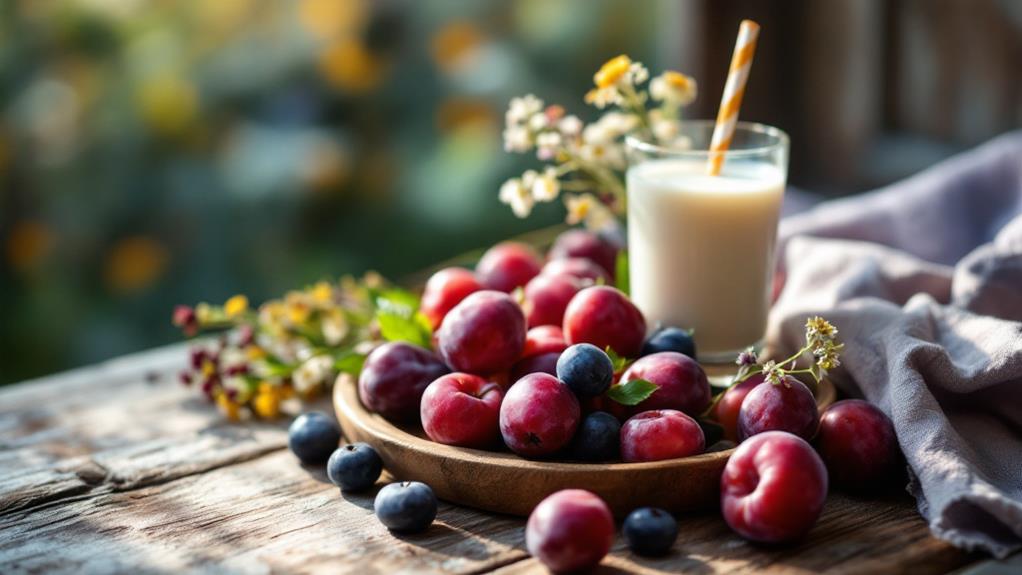
Beyond supporting digestive health, prunes offer important benefits for your bones. Regular consumption of these dried fruits has been linked to improved bone density, especially in postmenopausal women, highlighting their potential to protect against osteoporosis. Prunes are packed with key nutrients like vitamin K, potassium, and magnesium, which are critical for maintaining strong bone health and preventing bone loss. By incorporating them into your diet, you're giving your bones the support they need to stay robust and resilient.
Research suggests that eating two servings (100 grams) of prunes daily can greatly boost bone formation and inhibit bone resorption. This dual action not only promotes comprehensive skeletal strength but also helps combat the bone loss that comes with growing older. Animal studies further bolster these findings, showing that dried plums can actively aid in preventing and even reversing age-related bone weakening.
Moreover, the antioxidant properties of prunes, including compounds like caffeoylquinic acids, play an important role in maintaining bone health. They reduce oxidative stress, a factor that contributes to bone degradation. By minimizing oxidative damage, prunes help preserve bone integrity, making them a valuable supplement to your diet for long-term bone health.
Cardiovascular Health Advantages
Cardiovascular health is paramount for general well-being, and incorporating prunes into your diet can make a notable difference. These small fruits pack a punch by offering multiple benefits that improve heart health. Initially, prunes are effective in reducing LDL cholesterol levels, which is vital for a healthy heart. Eating 12 prunes daily can considerably lower cholesterol, especially in those with high cholesterol levels.
Secondly, prunes are a powerhouse of potassium. This important mineral helps regulate blood pressure, leading to decreased systolic and diastolic readings. Regular consumption of prunes has been associated with improved blood pressure levels, which is a critical component of cardiovascular health.
Additionally, prunes are rich in antioxidants, particularly phenolic compounds. These antioxidants play a significant role in reducing oxidative stress and inflammation, protecting your heart from long-term damage. The following list highlights key cardiovascular benefits of prunes:
- LDL Cholesterol Reduction: Lowering bad cholesterol levels.
- Blood Pressure Regulation: Thanks to high potassium content.
- Antioxidant Protection: Reducing oxidative stress and inflammation.
Prunes also aid in weight management due to their high fiber content, which is fundamental for maintaining a healthy weight and subsequently supporting overall heart health.
Blood Sugar Management
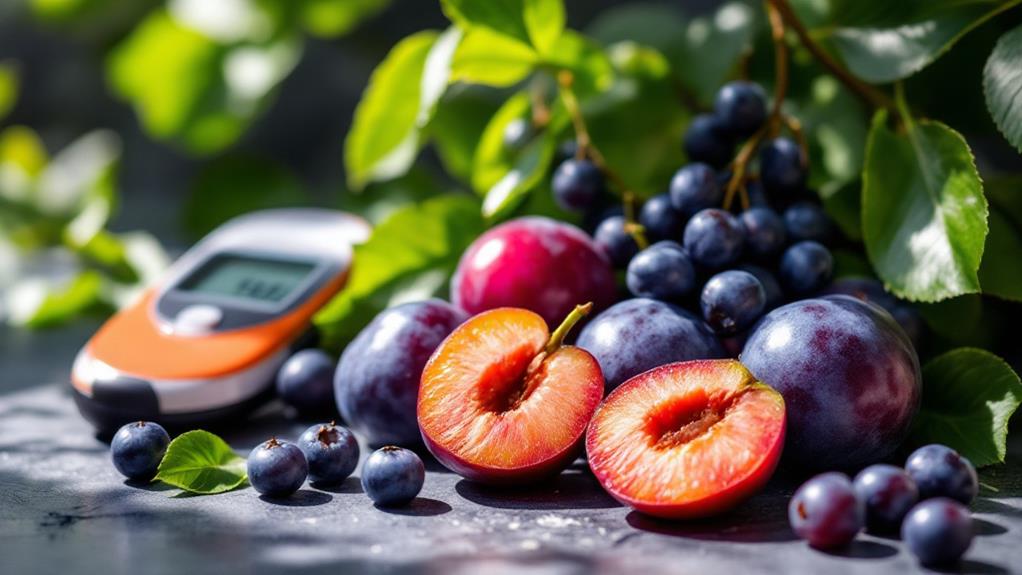
While prunes have already proven their value for heart health, they also offer impressive benefits for blood sugar management. Their low glycemic index guarantees that consuming plums and prunes won't lead to significant spikes in your blood sugar levels, making them a smart choice for those managing diabetes. The high fiber content in these fruits, especially in prunes, plays an important role in slowing down carbohydrate absorption. This helps regulate post-meal blood sugar levels, a key aspect of glycemic control.
Incorporating prunes into your diet can also lead to increased adiponectin levels. This hormone is fundamental for blood sugar regulation and may reduce the risk of developing type 2 diabetes. A serving of prunes, about 4-5 pieces, provides a satisfying snack with only 67 calories and 18 grams of carbohydrates, making it nutritious without causing rapid blood sugar increases.
Culinary Versatility
Engage yourself in the world of culinary versatility with plums and prunes, as these fruits can transform ordinary meals into delightful experiences. Regardless of if you're seeking a burst of natural sweetness or a way to improve savory dishes, plums and their dried counterparts, prunes, have got you covered. Imagine adding a nutritious twist to your meals by incorporating these fruits, known for their impressive fiber content and support for digestive health.
Here are three enticing ways to investigate their culinary potential:
- Breakfast Lift: Start your day with a smoothie featuring fresh plums for a revitalizing, fiber-rich drink or mix prunes into oatmeal for added sweetness and chewiness.
- Savory Surprises: Raise your dinners with prune-stuffed pork tenderloin or a plum glaze over roasted root vegetables, introducing a unique flavor profile to your favorite savory dishes.
- Baking Bliss: Enrich your baked goods by adding prunes to muffins or breads, infusing them with moisture and natural sweetness while increasing their nutritional value.
With these simple yet flavorful recipes, plums and prunes can become a staple in your kitchen, turning everyday meals into culinary delights.
Potential Risks and Precautions
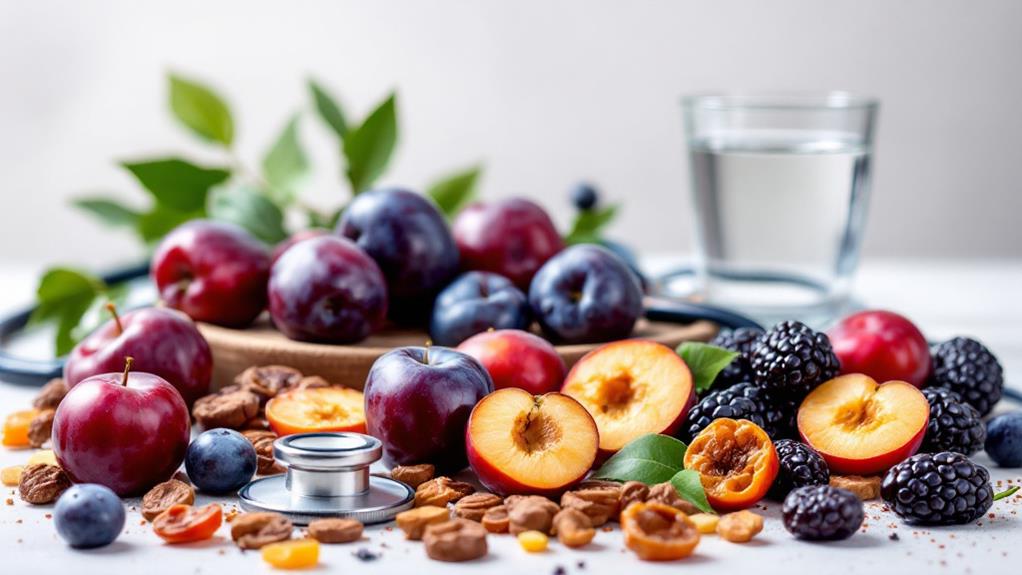
When considering the inclusion of plums and prunes to your diet, it's vital to be aware of potential risks and precautions. Eating too many prunes can cause digestive discomfort like bloating and diarrhea due to their high fiber and sorbitol content. To avoid these unpleasant effects, moderation is key. Furthermore, if you have diabetes, keep in mind that prunes contain high sugar levels, which can lead to blood sugar spikes. Consuming them in controlled amounts is necessary to manage your blood sugar effectively.
For those with allergies, be cautious, as some individuals might experience allergic reactions or intolerances to plums or prunes, even though these are rare. Always remove the stones from plums to prevent choking hazards and potential esophageal injury. If you're on medications such as blood thinners, consult your healthcare provider before incorporating large amounts of plums or prunes to your diet. There could be interactions that affect your medication's efficacy.
Storage and Usage Tips
Now that you're aware of the potential risks of consuming plums and prunes, let's make certain you store and use them properly. Proper storage is crucial to preserve the vitality and nutritional value of these fruits. Fresh plums should be kept in the refrigerator to maintain their crispness and flavor. For dried prunes, a cool, dry place in a sealed container is ideal, ensuring they last up to a year. You can also freeze dried prunes for extended storage, making them a convenient snack option whenever you desire.
Consider these usage tips to make the most of your prunes:
- Stewed Prunes: Boil prunes with water, lemon, and maple syrup until soft. Cool them down and store for a nutritious dessert.
- Prune Juice: Make a revitalizing drink by boiling 300 grams of prunes with 2 liters of water. Blend, strain, and refrigerate for later.
- Culinary Improvements: Add prunes to smoothies, salads, or baked goods to elevate flavor and amplify nutritional benefits.
With these storage and usage tips, you can enjoy plums and prunes in delicious recipes while maximizing their health advantages.

